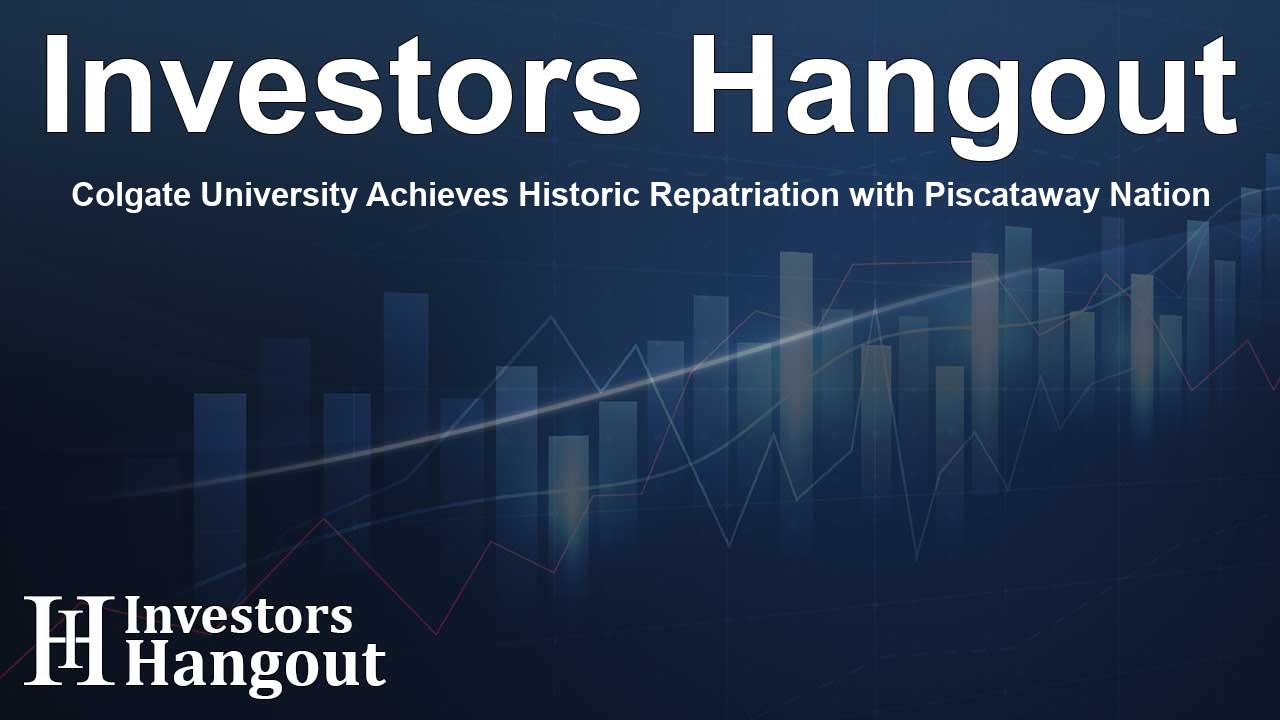Colgate University Achieves Historic Repatriation with Piscataway Nation

Colgate University and Piscataway Nation's Historic Repatriation
In a groundbreaking ceremony, Colgate University and the Piscataway Indian Nation marked a significant achievement by completing the first-ever repatriation of ancestral remains under the Native American Graves Protection and Repatriation Act (NAGPRA). This historic moment highlights the deep connection between Indigenous peoples and their ancestral heritage.
The Journey of the Ancestor's Remains
The ancestral remains, which had been held by Colgate University since 1948, were the longest-held collection at the Longyear Museum of Anthropology. This repatriation stands as a testament to the University’s long-standing commitment to reconciliation and collaboration with Indigenous nations. The return of these remains follows several years of cooperation between Chesapeake Bay-area Indigenous Nations and Colgate University.
Chief Mark Tayac's Remarks
Attending the ceremony were Piscataway Indian Nation Chief Mark Tayac, his wife Evelyn, and Peter Landeros of the Pascua Yaqui Tribe. Chief Tayac expressed profound sentiments about the return of the Ancestor, noting the importance of honoring the original instructions from the Creator. "Today, we are helping this Ancestor fulfill that original instruction and to rest in peace," he stated. His words resonated with the essence of familial bonds and reverence for those who have passed.
Legal Framework Under NAGPRA
NAGPRA mandates the return of ancestral remains to recognized Tribes, bands, or nations. The individual involved in this repatriation was identified as a member of the Piscataway peoples, who gained state recognition in Maryland in 2012. This legal framework not only serves to return ancestors to their rightful communities but also seeks to acknowledge the historical wrongs that Indigenous peoples have faced.
Repatriation Efforts Over the Years
Colgate University's journey towards repatriation began as early as 2004 when initial communications were made to the National NAGPRA. However, substantial efforts commenced in 2021 to engage and consult with the Piscataway Nation and other Indigenous groups. Rebecca Mendelsohn, Co-director of University Museums, and NAGPRA Coordinator Kaytlynn Lynch led the initiative, underscoring the importance of collaboration and cultural heritage sensitivity.
Documentation and Approval Process
In November 2023, comprehensive research and documentation were submitted to the National NAGPRA, initiating the formal acknowledgment of the Ancestor's cultural affiliation. Following an official announcement in January 2024, consultation with tribal representatives continued, culminating in a ceremony that Chief Tayac described as a historic moment for all involved.
Commitment to Redress Historical Wrongs
Lesleigh Cushing, Provost and Dean of the Faculty at Colgate, expressed gratitude towards her colleagues committed to rectifying historical injustices related to museum collections. This moment serves as a pivotal step in restoring dignity and respect for Indigenous cultures, allowing the Ancestor to return home.
Looking Forward: Building Relationships
The repatriation ceremony not only restores the Ancestor to their rightful place but also reaffirms the commitment of both Colgate University and the Piscataway Nation to build meaningful relationships moving forward. The collaboration represents a critical effort to heal and honor the interconnectedness of communities and ancestors.
Frequently Asked Questions
What is the significance of the repatriation ceremony?
The ceremony marks the first successful repatriation of ancestral remains in Maryland, celebrating the collaboration between Colgate University and the Piscataway Nation.
What is NAGPRA?
The Native American Graves Protection and Repatriation Act (NAGPRA) is a federal law that mandates the return of Native American cultural items and ancestral remains to their respective tribes.
Who attended the repatriation ceremony?
Key attendees included Chief Mark Tayac of the Piscataway Nation, his wife, and representatives from Colgate University, symbolizing the bond between the institutions.
What steps led to the repatriation?
The process involved years of collaboration, documentation, and consultation with the Piscataway Nation, leading to the formal acknowledgment of the Ancestor's cultural ties.
How does this event impact Indigenous communities?
This event is crucial for Indigenous communities as it signifies recognition, respect for cultural heritage, and a move towards resolving historical injustices.
About Investors Hangout
Investors Hangout is a leading online stock forum for financial discussion and learning, offering a wide range of free tools and resources. It draws in traders of all levels, who exchange market knowledge, investigate trading tactics, and keep an eye on industry developments in real time. Featuring financial articles, stock message boards, quotes, charts, company profiles, and live news updates. Through cooperative learning and a wealth of informational resources, it helps users from novices creating their first portfolios to experts honing their techniques. Join Investors Hangout today: https://investorshangout.com/
Disclaimer: The content of this article is solely for general informational purposes only; it does not represent legal, financial, or investment advice. Investors Hangout does not offer financial advice; the author is not a licensed financial advisor. Consult a qualified advisor before making any financial or investment decisions based on this article. The author's interpretation of publicly available data shapes the opinions presented here; as a result, they should not be taken as advice to purchase, sell, or hold any securities mentioned or any other investments. The author does not guarantee the accuracy, completeness, or timeliness of any material, providing it "as is." Information and market conditions may change; past performance is not indicative of future outcomes. If any of the material offered here is inaccurate, please contact us for corrections.